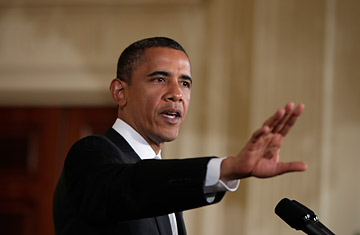
President Barack Obama delivers remarks on the National HIV/AIDS Strategy in the White House, July 13, 2010.
As he juggles the demands of a moribund recovery, multiple foreign conflicts and the reverberations of a catastrophic oil spill, President Obama still has more supporters than opponents. In a new TIME poll, 49% of respondents say they approve of the President's performance, compared to 45% who disapprove. And yet the President's popularity is at odds with the stinging appraisals of many of his signature policies, which lead 56% of voters to say the U.S. is on the wrong track.
Just 44% of poll respondents backed Obama's stewardship of the economy, which 90% rate as fair or poor. Forty-three percent of poll respondents say the $862 billion Recovery Act, which a July 14 White House analysis credits with creating or saving some 3 million jobs, has helped, while 53% think the country would be better off if the money hadn't been spent. Despite economists' assertion that an additional injection of capital would help catalyze a recovery and head off a double-dip recession, such a step would be politically perilous, with two thirds of respondents—83% of conservatives, 38% of liberals and 67% of self-identified "middle" voters—opposing a second stimulus.
While Obama's approval rating on foreign affairs remain high—he earned a 52%-41% split overall, with respondents favoring his handling of the Afghan war by a 47%-44% margin—his domestic marks are considerably worse. Fifty-four percent of voters disapprove of Obama's leadership during the oil-spill crisis, and 53% are unhappy with his performance on immigration policy.
The survey contained a batch of good news for both the President and Congressional Democrats, however. Asked to assign blame for the balky economy, 61% point to the Bush Administration, while 27% fault Obama. The President notched a favorable 31%-26% split between voters who believe his economic policies have helped and those who think they hurt, while nearly 80% believe the economy is stable or heading in the right direction. And despite the economic upheaval and political acrimony that have marked his term thus far, voters aren't pining for Obama's predecessor; they tapped Obama over George W. Bush by a 53%-33% margin. Nor are they convinced that Sarah Palin is up to the challenges of the Oval Office. Obama clobbered Palin, 55%-34%, in a hypothetical 2012 matchup that should have Democrats salivating.
At the other end of Pennsylvania Avenue, Capitol Hill Republicans giddy at the prospect of reclaiming one or both chambers of Congress in November may want to temper their expectations slightly. By a 43%-39% margin, voters place greater trust in the Democratic Party's ability to preside over an economic recovery, and 43% said they currently plan to vote for a Democratic congressional candidate, edging the 42% who prefer their district's Republican.
If the GOP manages to capture the House or Senate, the party's promise to pare back the federal deficit may collide with voters who have grown accustomed to the benefits that come with that largesse. Asked how they would reduce the deficit, respondents favored trimming the defense budget, a measure that is anathema to the leadership of a party that prizes its historical edge on national security issues. Other paths to deficit reduction highlighted the ideological gulf between Republicans and Democrats. Conservatives were more than twice as receptive (49%-21%) as liberals to cutting unemployment compensation, and they remain wary of healthcare spending, with 52% supporting fewer resources for the sector, compared to 8% of liberals. And despite widespread agreement that the trajectory of entitlement spending is untenable, tackling the hot-button issue would require a willingness to weather the repercussions. Voters cited Social Security and Medicare as the two expenses they were least eager to cut.
The poll, conducted by ABT SRBI, surveyed 1,003 adults — 88% of whom identified themselves as likely voters — on July 12-13.
